Wates boss Eoghan O’Lionaird has been in post for just over a year. He tells Dave Rogers about the challenges facing the industry, its razor thin margins, his belief in purpose over profit – and why he gave up golf
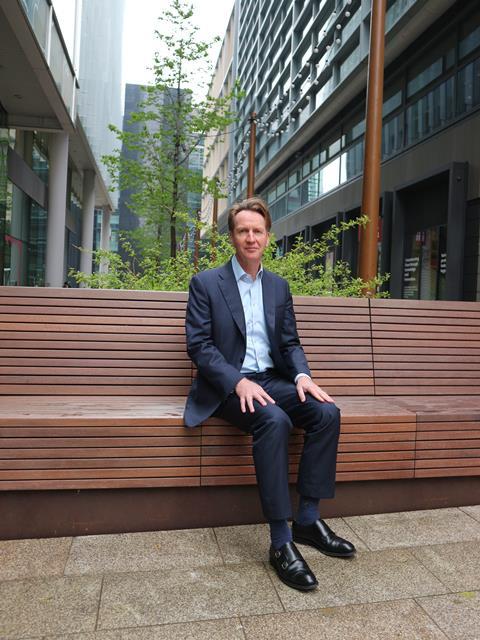
“I grew up in a large family: 10 boys, two girls. They called me 11 of 12. They can’t be bothered with my name.”
Wates chief executive Eoghan O’Lionaird likes to deadpan. Take his first name. To be clear, is it pronounced Owen?
“You are pronouncing it perfectly correctly,” he happily confirms when asked. “There is a lot of redundancy in the name, but I’ve explained it, I think, once or more every day since I left Ireland. That’s a long time ago.”
Since then, he has lived in several countries and visited around 50 as part of a career that has seen him work for firms in Japan, the US, Germany and the Netherlands.
He now lives in Virginia Water, the Surrey village that is home to Wentworth golf course. His neighbours include the golfer Colin Montgomerie, singer Elton John and Gareth Bale, the former footballer, who for people who follow these things, is developing into a fine golfer.
O’Lionaird admits he has probably spent too many hours with his clubs in the past. “I used to be into golf – until I recovered.” He explains further: “I used to play a lot. I lived in Japan for a while but I kind of got tired as a player. You play with clients and, living in Tokyo, you’d have to travel. You’d get up at 4am, tee off at 6 – to lose. Not good manners to win.”
He grew up in West Cork – “the middle of the middle of nowhere” – on a farm. It was an idyllic childhood, he says. His parents were not farmers, though. His dad was a teacher. “Mum was a full-time homemaker, a saint if ever there was one.”
Aged 57, he has since worked for a mining company, an electronics firm, a life sciences conglomerate before eventually becoming CEO of a listed marine business.
Now the chief executive of Wates at the second time of asking, he has been in the role for just over a year. What does he, a genuine outsider, make of construction, then?
“On some levels, it’s a very straightforward industry: an investor finds the money, they find an architect, they get planning, they hire a main contractor, the main contractor hires the supply chain, they build it and hand it over.
The main contractor, the one at the top of the pyramid, they don’t make any money
“It’s much more straightforward from a distance than many of the businesses I’ve worked in. You don’t have to invent things and, once you start building the product, there is no competition.”
But, but, but… There is always a but with construction.
“But it is an industry that has significant long-term challenges, something that I haven’t encountered before. One of them is that the main contractor, the one at the top of the pyramid, they don’t make any money.”
O’Lionaird seems genuinely baffled. “They take all the risk but they’re the least renumerated. It’s a curious construction. At Wates we know how to make money but, structurally, that’s how it’s set up. That’s new to me. [Construction] is straightforward on paper, but we should make more money.”
His previous experience of the industry was working on the Docklands Light Railway in Canary Wharf as a summer job, when he was at university. He was on a jackhammer. “Oh my God, I couldn’t move my hands,” he winces. “But I made a lot of money.”
After leaving school, he stayed local and went to college in Cork, studying for a degree in electrical and micro electronic engineering at University College Cork.
But there was no work in Ireland when he graduated at the start of the 1990s, so he left. Things have changed since, though, with O’Lionaird the only one of his 42 classmates now still living overseas.
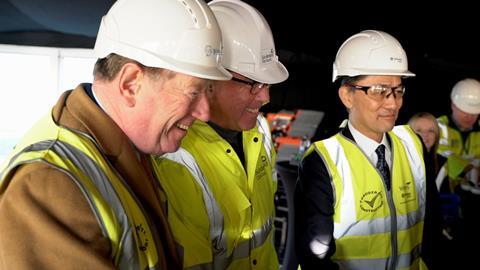
“I decided that, if I had to leave Ireland, I would go somewhere interesting,” he says. So he ended up in Japan, living there for four years while working for mining and smelting firm Mitsui Kinzuko. The job then took him to the US, where he lived in Arizona while working on a copper mine scheme across the border at Nacozari in Mexico.
He lived at weekends in the US and spent five days a week in Mexico. “We were in a camp in the middle of a mountain,” he recalls.
O’Lionaird eventually left North America, where he also shuttled between Indiana and South Carolina, for Bangkok in Thailand, where he lived for a couple of years, before he was asked by Mitsui to return to Japan. “I declined,” he says.
Why? “Why indeed? I think I was quite keen to get closer to home – Ireland if I could, parents getting older – and I think I felt in my bones, if I was to go to Japan, I’d probably never leave. It was a much more senior role, would have been a very good job.”
He left to do an MBA in Switzerland, in Lausanne, where he met his wife, who is from Lebanon, before he got a job with Philips, the Dutch multinational, based in Eindhoven.
It was the first time I recall being in a business where purpose was so important. What you were doing had a reason
He initially worked for its mobile phones arm, which had begun adding cameras to its phones, before heading up its faltering MRI scanners business. For O’Lionaird, this seems to have been a turning point in his career.
“It was the first time I recall being in a business where purpose was so important. What you were doing had a reason.”
One incident in particular affected him. He was asked to fly out to a children’s hospital in Miami, where he was met by a doctor called Nolan Altman. “How can I remember that name 20, 25 years later? If you Google him, he’s a luminary when it comes to paediatric radiology.”
The doctor met O’Lionaird at the front door. “Warm handshake, ‘lovely to see you Eoghan, I really appreciate you coming all this way’ and he walks me through the hospital and, as we’re going around, I know why he wants to see me. He owned three of our scanners and that morning none of them were working.
“His core message was: ‘Well, none of them is working. By the way, last night the reason that’s important was I had an eight-year-old, it was a brain tumour, who came in for a scan so we could understand where to operate and I put him on the machine. The machine didn’t work and he died.’ That, I have to tell you, stays with you.”
>> See also: Wates restructures construction arm and sets up major projects business
>> See also: ‘The industry is broken.’ The soul-searching begins as London M&E specialist succumbs to familiar foes
O’Lionaird spent a decade and a bit at Philips before leaving to join US conglomerate Danaher, a firm with an income of $24bn last year, for three years and then to UK instrumentation firm Spectris, shuttling between London, his home near Eindhoven and Germany, where Spectris has an office.
By the time he left in 2019, a recruiter had approached him about the Wates job, but he admits he wasn’t interested. Instead, he took on the chief executive’s role at a listed marine services business called James Fisher and David Allen, then the Wates financial officer, took over from Andrew Davies, now boss of Kier, who had left originally to take up the chief executive’s role at Carillion.
Since my days at Philips, purpose comes before profit and profit follows purpose. I’m a firm believer in that
But Allen left in autumn 2022, the recruiters called again and this time O’Lionaird had a rethink. He agreed to meet James Wates, then the chairman, and James’s cousin Tim, who took over as chair a year ago.
So what changed his mind? “I felt that I had given as much as I wanted or could give to Fisher at the time, so I was open to other opportunities,” he says.
“The recruiters were quite keen to get someone who believed that purpose was important. Since my days at Philips, purpose comes before profit and profit follows purpose. I’m a firm believer in that.”
He carried out his due diligence on his would-be new employer, even calling up friends from college who were now in construction. “The feedback was uniform: ‘a principled operator’, one of my friends said. He was a direct competitor.”
O’Lionaird’s appointment continued a tradition of Wates going outside the industry to bring in new chief executives, with Paul Drechsler arriving from ICI 20 years ago and his successor Davies joining from BAE Systems a decade later.
“They have form for hiring from outside. The shareholders are quite keen to not rest on their laurels and say, ‘we know everything’. Let’s bring in some other people, fresh pair of eyes, they invest in that.
“The fact [the Wates job] was in construction, I didn’t find daunting,” O’Lionaird adds. “When I was at Mitsui, I spent four out of five days on construction sites.”
He says he went into construction with his eyes wide open but if he is baffled by how the industry works, he is particularly taken aback by its margins. “The risk versus reward is totally out of kilter,” he says.
His own firm produced a record set of results last year, with income up 15% to £2.2bn and pre-tax profit up a third to £46m. That’s a margin of 2%. These are record results, remember.
But O’Lionaird is unfazed. “There is a real opportunity here. If we add more value, we’re going to make more money. [Construction does] great and important things. Purpose costs money and we need to invest in our people, communities, supply chain. Each of which we do – but we can do more. But to do that, we need to make money.”
Given that he has worked for firms whose pre-tax margins have been 10 times the Wates figure, he admits that 2% is a “very small number and it should be bigger”. He initially does not want to say by how much, in case he ends up with egg on his face, but then admits: “It should be double that.”
O’Lionaird thinks construction is more adversarial than the other industries he has worked in but reckons this all stems from the margins that firms make. “People who bid below cost?” He is incredulous.
“We should outlaw that. That’s not the way to run one’s life. That drives the adversarial relationship because the guy who has lowballed has to get something out of it.”
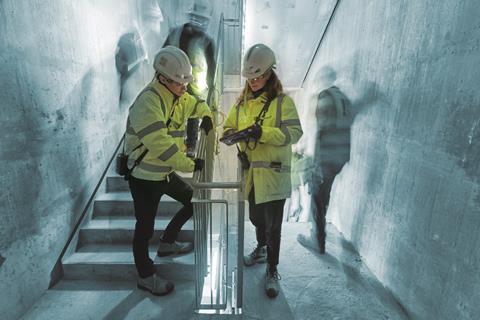
He has no truck either with those firms prepared to cut corners to save pennies. “I don’t know any company that doesn’t take its responsibilities seriously but no doubt we get some operators who are stressed and they feel they need to cut corners and we can act unprofessionally as an industry at times. That’s got to stop.
“It has created a bad reputation for the industry at times in pockets. 90% of the time we do it well – all of us. 10% of the time, there are people who let themselves down and bring the industry’s reputation down with it. At Wates, we have no time for that. We will not work with subcontractors cutting corners, being sloppy.”
He thinks the Building Safety Act is a “fine piece of legislation” adding: “It’s a timely piece of legislation that will professionalise the industry to a much higher level. It’s long overdue.”
But, despite being surprised by some of the things he has found, he talks with fondness about his new sector. “It’s an industry that has a profound impact on society. It creates places where people live – homes, offices.
“We can have a very positive impact on the environment. Done carelessly, we can have a negative impact on the environment.”
We’re all having a look at each others’ balance sheets. Clients of all colours look at the balance sheet
Wates employs around 4,500 people and O’Lionaird says: “I have worked in some very good, professional companies and I would put the people we have here up against any of the others in terms of knowledge, competence and professionalism. I don’t think the industry is short of professional employees and leaders. It just needs the incentive to button things down to another level.”
It has felt like construction has been under siege at times in the past few months, and O’Lionaird agrees the catalysts for that have been the collapses of Buckingham and MJ Lonsdale last autumn. A few days after this interview, another name, Osborne, set up in 1966 – the year O’Lionaird was born – said it was set to go into administration.
O’Lionaird says one consequence of these collapses is that firms are now running the rule over each others’ balance sheets much more than before, with due diligence being tightened up. “No doubt about it. Everybody is employing [business analytics firm] Dun & Bradstreet and not just to get the one-pager. We’re all having a look at each others’ balance sheets. Clients of all colours look at the balance sheet.”
He says the impact of a firm going bust on a job can be catastrophic, with delays of up to a year in some cases. “I can tell you, that focuses the mind.”
He thinks some clients are better than others, adding: “I haven’t come across any that I think set out to be a bad client. We’ve seen a lot of stress from our supply chain, clients as well. Some clients have responded better than others to that stress. I’ve not seen any set out to misbehave simply to get one over on us, but the stresses have been evident in some instances.”
A little over a year into his role, O’Lionaird has seen enough to come to a familiar conclusion. “This is an industry populated by great companies, great people, hand on heart. We can just do things a little better, we can help ourselves a little better and we need to demonstrate our value a little better.”
The £2bn turnover firm
With an income of nearly £1.2bn, Wates’ construction business is its biggest. “And it will be for a while,” says chief executive Eoghan O’Lionaird.
“We have more demand than we can service. We’re not chasing revenue. We want to be paid fairly. We turn lots of work away. More people have to do that and not be afraid of saying no. We want to engage in projects where we bring something distinctive.”
He says the firm tries to operate like a plc and, for a private business, it is quick off the mark with its annual numbers. Its 2023 figures came out at the end of March – some private contractors take months and months to file their accounts – and these saw it break the £2bn turnover barrier for the first time in its 127-year history, posting an improved profit of £46m.
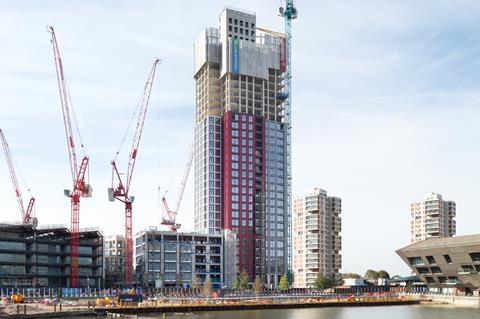
What’s the main focus for this year? “I’d like to hold the number [revenue] and improve the bottom line,” O’Lionaird says.
He says the firm, which launched a major projects division last year, has a good balance sheet, with year-end cash sitting at £138m, down from £207m last time, although O’Lionaird said this was because of investments made in the business over the year. The firm is also debt-free with its order book flat at £8.5bn.
He wants its SES building services arm to carry out more building management systems and fire safety work while he says there are opportunities to make modular homes and put them up quickly in order to tackle housing shortages.
Wates has its own offsite factory in Coventry mainly producing kit for the SES business. Of the wider problems in offsite, with firms going bust, he says: “Nobody has cracked the code on volumetric offsite. People still need to figure out the economics of how it all stitches together.”
City sights
Well-travelled, O’Lionaird says his favourite country is, still, his home one. “Ireland is special,” he admits. He has a base there as well as in the UK and Lebanon.
He has been living in the UK now for five years and says he fell in love with London when he was at college and coming across the Irish Sea to work on the Docklands Light Railways in his undergraduate days. “It’s a beautiful city,” he says, “so many old buildings, particularly in the Square Mile.”
His favourite is a church off Cornhill called St Michael’s. “It’s got a tiny little facade but you go inside it and it magically opens up. I’m not particularly religious but I do appreciate a church. There’s a lot of churches in London – mostly empty.”
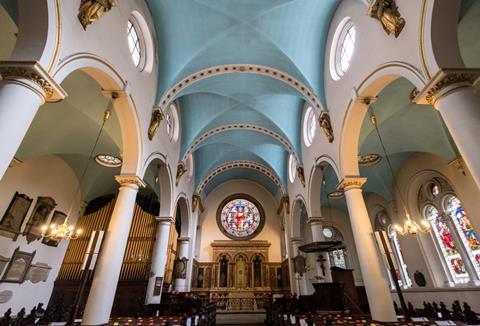
The UK has always been welcoming for the Irish, he says. “We have much more in common than separates us. Culturally, we’re very similar, our values are similar.”
A Manchester United fan since the age of four – “In Ireland it’s them or Liverpool” – he has two sons, aged 13 and 20. So not quite enough to make up the football teams that he and his 11 siblings used to assemble.
“Anything with a ball – we were on it,” he says.




























1 Readers' comment